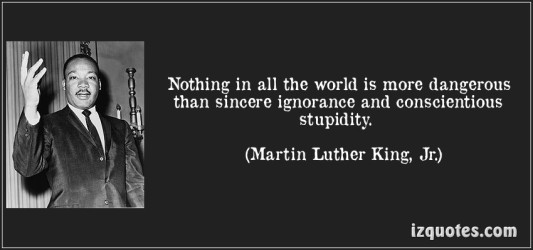
I was recently introduced to a fascinating psychological concept known as the Dunning Kruger Effect.[1] One reason it grabbed my attention was that John Cleese, of Monty Python fame, was the one who introduced it to me. You may not be aware that Cleese is a Visiting Professor at Cornell University, where he lectures on the creative process, among other things. Wouldn’t you love to take classes from him?
Cleese describes the effect: “in order to know how good you are at something requires exactly the same skills as it does to be good at that thing in the first place. Which means, and this is terribly funny, that if you are absolutely no good at something at all, then you lack exactly the skills that you need to know that you’re absolutely no good at it.” He adds “You see, if you are very, very stupid, how can you possibly realize that you are very, very stupid? You’d have to be relatively intelligent to realize how stupid you are.”[2]
The Dunning Kruger Effect is a phenomenon where unskilled individuals rate their own abilities much higher than they really are, simply because they lack the skills to properly evaluate their own skills. This idea has been validated in well-constructed studies measuring self-awareness of social, logical and grammatical skills. Statistical analysis showed that the effect held true in each of these unrelated areas. Another portion showed that when individuals received some training in the subject material, their ability to self-assess improved significantly.[3]
This has been compared to the “Lake Wobegon Effect,” as stated by Garrison Keillor: “where all the women are strong, all the men are good-looking, and all the children are above average.” Without proper feedback, everyone views themselves as above average. And most of us realize that this is a mathematical impossibility. Of course, there is no research to substantiate this effect.
What does this mean for leaders? How can we apply this? If the unskilled cannot accurately evaluate their own performance, how can we expect them to function better? The leader must invest time and effort in training the people he leads if he expects his organization to move forward. It may be argued that only the leader’s investment in himself or herself is more important.
This training may also be delegated to other capable individuals. But the unskilled must have good mentors! And the mentors also need regular guidance.
I believe that this is why so many leaders choose to micromanage: to them, it seems simpler to manage everything themselves than to train their followers. In like manner, it is much quicker for a parent to do household chores than to take the time to help their children learn. But the time invested pays big dividends.
This is a lesson that a teacher should understand well. As our dental students begin to learn dental skills, I have noticed that it is difficult for them to evaluate their work, but as they progress, their evaluation skills tend to improve. And it is absolutely critical that they learn to accurately self-assess before they receive their degrees! I will never forget the morning a new third-year student received a start check to perform just his second restorative procedure on a live patient. With an air of confidence, he told the attending faculty “In my experience this is very straightforward.” I wonder if he still feels that way.
And added challenge for the leader is that the incompetent are generally unable to recognize competence in others. Based on the work of Dunning, it becomes imperative that we make sure that those whom we lead have sufficient training to do what is expected of them. If we fail to provide that training, we are preparing our organization for failure. Individual growth leads to organizational growth.
A good leader trains his people.
“The doorstep to the temple of wisdom is a knowledge of our own ignorance.”
-Benjamin Franklin
[1] Dunning, D., et al. (2003). Why People Fail to Recognize Their Own Incompetence. Current Direction in Psychological Science, 12:3, 83-87.
[2] YouTube. John Cleese On Stupidity, http://www.youtube.com/watch?v=wvVPdyYeaQU
[3] Kruger, J., & Dunning, D. (1999). Unskilled and unaware of it: How difficulties in recognizing one’s own incompetence lead to inflated self-assessments. Journal of Personality and Social Psychology, 77, 1121–1134.

Reblogged this on One Small Voice Scripture Review and commented:
Goes to show,
“The more you know you know you know, the more you know the less.
LikeLike